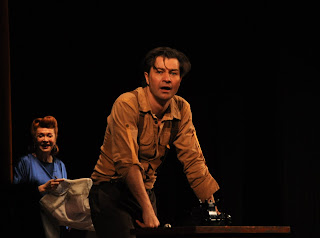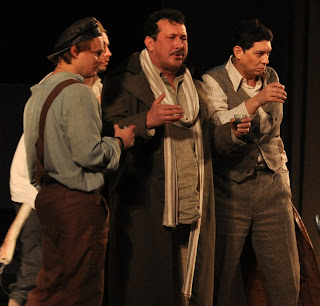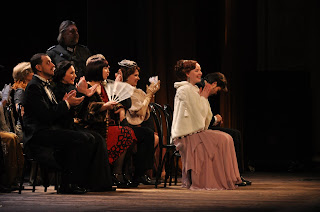"Life is a disease and
death begins
from birth.
Every breath,
Every heartbeat, is a
moment of dying -
a little shove towards the
end. "
"Three Comrades"
"The performance is almost four hours
long", warn strict controllers at the entrance to the National Drama
Theatre named after I. Franco. To some viewers this remark is a little
alarming; to others - theatre lovers - causes an ironic smile. And it also delights,
which means a good production. My "piggy bank" of favorite
performances, along with such as "Glory to Heroes",
"Stalkers" on Kiev stage, was enriched with a new work of
"Frankovians" - "Three Comrades" based on the novel by
Erich Maria Remarque. And four hours fly by like one instant, which you want to
repeat.
It is important that three Donetsk actors appear in this
performance - "Frankovians" - Elena Khokhlatkina, Andrei Romaniy and
Lyubov Dobronozhenko play together.
Perhaps, Remarque is one of the few German writers,
whose works can be read to ecstasy. And I totally disagree with the statement
that he is depressing, as some believe. Moreover, after such a heartfelt
performance directed by Yuri Odinokiy. Despite the tragedy of being, it is
still a VERY LIGHT performance. Humane and modern. About love, frozen in
eternity.
The performance begins even before the curtain
opens - on the edge of the proscenium an array of shoes is neatly arranged. It
gives you the creeps. And you immediately remember a monument in Budapest -
"Shoes on the banks of the Danube." On the Franko stage, the
"lonely" pairs of shoes are a symbol of the dear and loved ones gone
forever into eternity.
The scenography is laconic: three cars hanging over
the stage, mobile "interiors" of a removable room, a car workshop and
a bar, a theater. And all are on a black background. In the gleams of the
playing light there is a life illuminated by outbursts of love and friendship.
Eternity, which envelops the gray car workshop of three comrades in a gray haze
- a modest but cozy place with the aroma of rum.
The play emanates light through the prism of the
realities of the post-war years. Three comrades
performed by Yevgeny Nishchuk, Andrei Romani and Alexander
Pecheritsa are a true trio of friendship. Genuine. Without
meanness and betrayal. Without pathos. But as strong as a burning rum.
Burned by the war - all three try to taste the
taste of life. A life that flies at furious speed, like their Carl. Life, where
the main thing is love, and the rest is just garbage and trash. It is the theme
of love, doomed, the director accents in the play - in the relationship between
Patricia Holman and Robert Lokamp.
Pat and Robbie embody the harmony of two principles
- rational and emotional. Angelica Savchenko creates the image of her character
as a romantic and gentle nature with impeccable taste, embodying an unearthly
aristocracy in the good sense of the word. External elegance organically
combines with the inner strength of the character of the heroine. Most of all,
Patricia is in love with life, from which she expects reciprocity.
Sometimes she flirts with the very fate.
And meets her in the form of Robert Lokamp. It is Pat who first calls him Roby
the child, thereby pointing to his infantile nature. He impulsive and sincere.
Despite his 33-year-old age, he is a boy in his soul. And this childish
spontaneity and naivety strengthen the belief in a beautiful feeling.
Indicative in this sense is the episode, where Robert has flare-up of jealousy
for Pat, and she with understanding and a gentle flair of irony
"repays" ridiculous jealousy with a kiss.
And if at the beginning of the play on his own birthday Robert shows
obvious indifference to everything, then after meeting Pat, the hero is inspired by new feelings.
Just like trees blossom in spring after "winter sleep". In the play,
episodes involving Pat and Robert sometimes "smell" of disturbing
mysticism which is amplified by music. And it's no coincidence that Pat on
their first date appears, like a "ghost", from the darkness of the
conditional streets of Berlin.
In the play, Robert and Patricia sometimes resemble two birds sitting on
different branches, but ready to fly to each other at the first opportunity.
And it seems that their joint "flight" can last forever, despite the
rain or snow. But time is ruthless. It invisibly dominates all Remarque’s
characters . And the dance in the rain of the two doomed lovers is like a violent struggle between life and
death. In fact, it's a struggle for the fading time.
And the closer the final of the play, the more distinctly
Robert-Nishchuk delineates this dramatic note. " It seems as if the world had been created by a madman who could think of
nothing better to do with the marvellous variety of life that he created but to
annihilate it again," says Robert Lokamp.
It is the tragedy that can be understood only from own life experience. Personal drama
intersects with what is happening on the stage. A fateful coincidence of circumstances:
while the rehearsals of the "Three Comrades" were taking place, the director
lost his mother, actor Yevgeny Nishchuk - his wife.
Time in the play seems to be flirting with the characters. On the one
hand, it forces them to make the same coveted step towards their happiness. On
the other hand, it throws them on the other side of life. Forever. And who
knows the value of every moment of this life better than artist Ferdinand (Oleg
Stalchuk)? He is the one who paints
portraits of those who left for another world and knows the value of every moment
of this life. He is a kind of prototype of the impermanence of existence.
" Life is colorful but not perfect." His
philosophical monologues-reflections addressed to comrades are aphoristic. They
sound like
father's instructions - without reproach, but with love and sincerity.
"Moment that we feel, but never have. Time is this infernal machine
that ticks and ticks, that goes on ticking and that nothing can stop ticking.
You can stay an avalanche, a landslide - but not this”.
And everyone has to smooth out
the imperfection of this life with their own colors. For example, for a
former soldier Valentine (Dmitry Zavadsky), it's a tavern where he spends most
of his time. Not needing pity and sympathy, he burns his life, because he does
not know what to do with this life after he became a cripple in the war. And he
is just " happy to live ", and he drinks
smiling another glass. There are no goals in life, but you can guess by the
look of his eyes humility and longing
for the former life.
Who are they - the three friends? Heroes of our time or mad romantics of
the "lost generation"? In part, they are both. The war crossed their
lives, leaving a scar in their souls. The military past reminds of itself in peacetime. While everyone is running
around enjoying the salute, Robbie, by habit, falls onto the ground. The
evidence of his military past is also the medals for military merit. Robert
either furtively hides them by the edge of the jacket, or on the contrary, wears them with pride.
Romance covered with gunpowder of war reveals their best qualities: decency,
honesty, responsiveness, and good nature. Comrades, who can both sneer at each
other, joke, but at the same time preserving and showing respect and good
nature.
"The time of the great dreams is over," says Robert as a
representative of that most lost generation. Broken dreams, lost ideals.
History repeats itself only shifting the emphasis. Is there absence of any
vector in life, where to go and what to strive for? The theme of the lost
generation is consonant with our reality. Returning from the ATO, as the war in
the Donbass is called, the soldiers are people who cannot always and everywhere
adapt to peaceful life. Life, where you do not fall onto the ground from
fireworks. Life, which fills their being with meaning. They returned, but crippled
by the war morally and psychologically. Muffling their pain with a
glass-another, they try to feel such
desired FREEDOM. Because "freedom is life."
To drink rum, drowning the pain of loss, to feel that desired freedom
from the world, from human suffering and even from yourself. The war has
remained in the past only in the time dimension. But not in consciousness. For
example, in this sense, the image of the former pilot Otto Kester, who killed
an unarmed young soldier in the war, is very revealing. And until now this act
is oppressing his soul, like a wound with "aching" pain. Otto waits
for an opportunity to restore justice - in his mind, in his soul. "He did
nothing bad. If I do not finish this bastard who killed our Hotfird, the whole
story of the Englishman would have been a terrible crime", says discerning Otto, a clear accent on the fact
that it is the" I-Otto "who must kill the killer of his comrade
personally to relieve this pressing "stone" from the soul. The
recognition of one's guilt intensifies the thirst for justice - uncompromising
and doomed.
Andrei Romaniy creates the image of Otto not only as of a reliable
friend who always thinks two steps ahead. Possessed by the idea of a revenge
for Lenz's death, he immediately "switches on" a fighter in himself,
tough, peremptorily being fearsome. He is one of the few actors in this play
who in reality knows what war is, because in his time he left Donetsk shaken by
battles. And on the stage, Otto-Romaniy is a balanced and contemplative nature,
but at the same time he embodies the tragedy of wartime. The unquenchable
thirst for justice remains unclaimed.
Naughty Gottfried Lenz in Alexander Pecheritsa's performance can be
described as a cheerful merry fellow. This is a kind and easy-going fellow. The
winning appearance of the artist - red-haired, with a charming smile, gives a
special "light." The energy of positivism and postwar fun emanate
from him, like the rays of the sun. What he would not say about are losses, disappointment, smile does not
disappear from his face. It harmoniously
combines the ease of perception of life and the uncertainty of life itself.
Life, which is burned cheerfully and fervently in taverns, theaters, is
filled with genuine feelings and emotions. Touching and heartfelt Hasse, whose
role is played by Vasily Basha, is an example of not only of a caring husband,
but of true devotion and unrequited love.
" Man invented the dream of eternity." Eternity,
into which the loved ones go. And the dance of widows with chairs, their
imaginary partners, literally "finishes" the pain of irreparable
loss.
"Live life to the fullest!" - says Ferdinand, who paints
portraits of those who left this world . This is a message, a message to us
all. And not only to those who survived the war on the front line. But to us,
the audience. Here and now. Alas, not everyone will catch up on
with their happiness. But the chance to become happy, even for a moment,
is given to all. Despite the soul-chilling snow mercilessly covering the hearts
of loved ones. Love and take care of your loved ones! Time flies much faster
than any car in the world. And four hours that the play lasts is the time spent
at the theater. This is also a small life, which allows us to understand that
we must always fight for every moment of our existence on earth.
P.S.The performance "is growing", it is gaining strength. I
particularly remember the performance on December 29, when the actor's
improvisation, the main performers especially, gave the play a mystical and
realistic touch; each episode was saturated with an exciting energy emanating
from the actors.
P.S.2 The musical design of the performance permeates every cell like an
electric current.











































